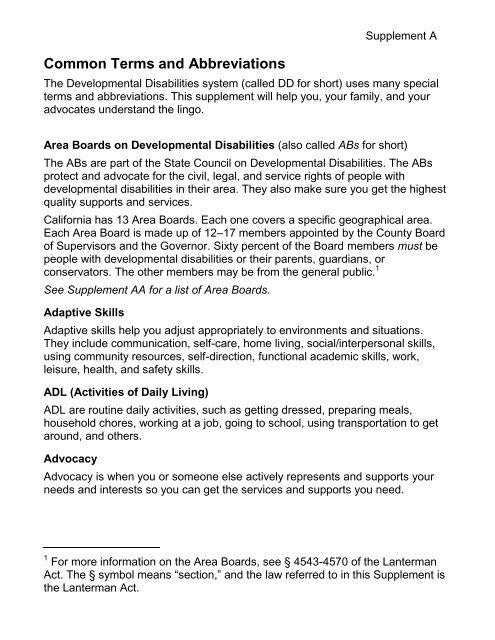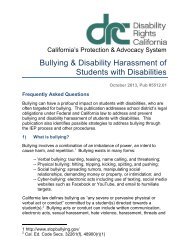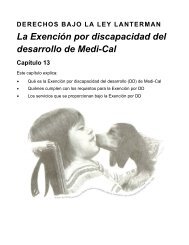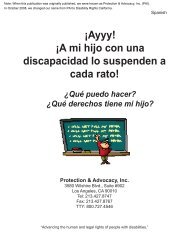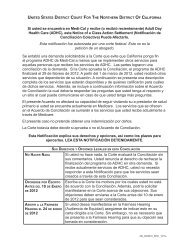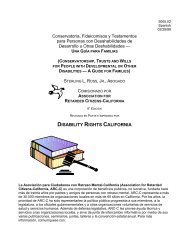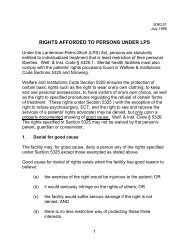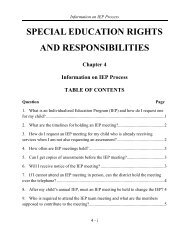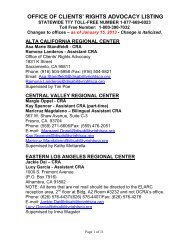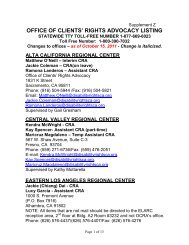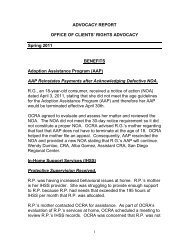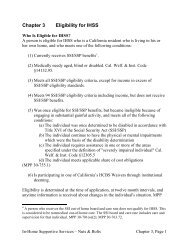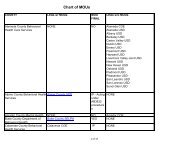RULA - Rights Under The Lanterman Act - Supplement A - Disability ...
RULA - Rights Under The Lanterman Act - Supplement A - Disability ...
RULA - Rights Under The Lanterman Act - Supplement A - Disability ...
Create successful ePaper yourself
Turn your PDF publications into a flip-book with our unique Google optimized e-Paper software.
Common Terms and Abbreviations<br />
<strong>Supplement</strong> A<br />
<strong>The</strong> Developmental Disabilities system (called DD for short) uses many special<br />
terms and abbreviations. This supplement will help you, your family, and your<br />
advocates understand the lingo.<br />
Area Boards on Developmental Disabilities (also called ABs for short)<br />
<strong>The</strong> ABs are part of the State Council on Developmental Disabilities. <strong>The</strong> ABs<br />
protect and advocate for the civil, legal, and service rights of people with<br />
developmental disabilities in their area. <strong>The</strong>y also make sure you get the highest<br />
quality supports and services.<br />
California has 13 Area Boards. Each one covers a specific geographical area.<br />
Each Area Board is made up of 12–17 members appointed by the County Board<br />
of Supervisors and the Governor. Sixty percent of the Board members must be<br />
people with developmental disabilities or their parents, guardians, or<br />
conservators. <strong>The</strong> other members may be from the general public. 1<br />
See <strong>Supplement</strong> AA for a list of Area Boards.<br />
Adaptive Skills<br />
Adaptive skills help you adjust appropriately to environments and situations.<br />
<strong>The</strong>y include communication, self-care, home living, social/interpersonal skills,<br />
using community resources, self-direction, functional academic skills, work,<br />
leisure, health, and safety skills.<br />
ADL (<strong>Act</strong>ivities of Daily Living)<br />
ADL are routine daily activities, such as getting dressed, preparing meals,<br />
household chores, working at a job, going to school, using transportation to get<br />
around, and others.<br />
Advocacy<br />
Advocacy is when you or someone else actively represents and supports your<br />
needs and interests so you can get the services and supports you need.<br />
1 For more information on the Area Boards, see § 4543-4570 of the <strong>Lanterman</strong><br />
<strong>Act</strong>. <strong>The</strong> § symbol means “section,” and the law referred to in this <strong>Supplement</strong> is<br />
the <strong>Lanterman</strong> <strong>Act</strong>.
Aid Paid Pending<br />
<strong>Supplement</strong> A<br />
This is your right to keep getting services while you wait for an administrative fair<br />
hearing decision. To keep getting services you must have filed for an<br />
administrative hearing within 10 days of the regional center or state<br />
developmental center’s notice that said your services would be cut back or<br />
ended. 2<br />
AM (Ambulatory) and Non AM (Non-Ambulatory) Facilities<br />
<strong>The</strong>se terms describe the consumers that a facility can serve. You are<br />
ambulatory if you can walk. According to fire regulations, if you can walk but have<br />
cognitive deficits, and cannot leave the facility without help in an emergency you<br />
may be considered<br />
non-ambulatory.<br />
Appeal<br />
An appeal is a legal process of challenging an official decision. In this manual,<br />
an appeal is the legal process of challenging a regional center or developmental<br />
center decision to deny or reduce your services. An appeal includes the informal<br />
meeting (optional), mediation (optional), and the state fair hearing. 3<br />
For more information on appeals, see Chapter 12.<br />
ARCA (Association of Regional Center Agencies)<br />
ARCA is an association of the 21 regional centers. ARCA negotiates contracts<br />
with DDS and takes policy and legislative positions on behalf of all the regional<br />
centers.<br />
ARM (Alternative Residential Model)<br />
ARM is a rate system for CCFs that serve people with developmental<br />
disabilities. 4<br />
Assessment<br />
Assessment is a procedure to identify your unique strengths and needs, and the<br />
services to meet those needs. It can include observations, reviewing your<br />
records, and formal testing. You must have an initial assessment to decide if you<br />
2 § 4715<br />
3 § 4701, et seq.<br />
4 Welfare and Institutions Code § 4681.1
<strong>Supplement</strong> A<br />
are eligible for regional center services within 120 days after your initial intake, or<br />
within 60 days if waiting longer would risk your health and safety. 5<br />
Assistive Devices<br />
<strong>The</strong>se are items or equipment that help you lead a more normal and productive<br />
life. <strong>The</strong>y can range from simple to complex.<br />
Authorized Representative<br />
Your Authorized Representative has the authority to speak for you so your<br />
interests and needs can be met. This person can be your parent or guardian (if<br />
you are a minor), conservator (if you are an adult), someone you chose or<br />
someone the Area Board appoints for you. 6<br />
Autism<br />
Autism is a pervasive developmental disorder (PDD) in children. Although<br />
behavior patterns of people with autism vary widely, generally people with autism<br />
have problems with social interaction and communication. <strong>The</strong>y also have<br />
repetitive and stereotypic patterns of behaviors, interests, and activities.<br />
<strong>The</strong> severity of autism varies from one person to another, and diagnosing autism<br />
can be difficult for many reasons. This is partly because autism and other PDDs<br />
share some common features, such as impaired social interaction and social<br />
behaviors.<br />
For more information on autism, see Chapter 2.<br />
Behavior Modification Services<br />
<strong>The</strong>se services and techniques help you change or adapt your behavior to<br />
protect your safety, the safety of others, and to improve your skills.<br />
CADDIS (California Developmental <strong>Disability</strong> Information System)<br />
CADDIS was going to be a statewide, computerized database that to coordinate<br />
all regional center and DDS data collection. <strong>The</strong> CADDIS program was cancelled<br />
in 2006, never having been implemented.<br />
Case Management or Service Coordination<br />
<strong>The</strong>se terms refer to planning, finding, and getting the services you need. <strong>The</strong><br />
regional center must actively help you do this. Usually your service coordinator is<br />
5 § 4643(a)<br />
6 §§ 4548(d), 4701.6, 4705(e).
<strong>Supplement</strong> A<br />
a regional center employee. But if the regional center approves, you, your parent,<br />
legal guardian, or conservator can be your service coordinator instead. Your<br />
service coordinator may also be called a case manager or Client Program<br />
Coordinator (CPC). 7<br />
Catchment Area<br />
A catchment area is the geographic area that a regional center serves according<br />
to its contract with the Department of Developmental Services (DDS).<br />
CCF (Community Care Facility)<br />
People with developmental disabilities may live or go to a CCF. A CCF can be<br />
residential (group home) or non-residential (day program). <strong>The</strong> Community Care<br />
Division of the Department of Social Services licenses CCFs. DDS usually sets<br />
the CCF rates for RC consumers, but sometimes the regional center negotiates<br />
rates.<br />
For more information on CCFs, see Chapter 7.<br />
CDER (Client Development Evaluation Report)<br />
CDER is a tool that records information about your disability, level of functioning<br />
and deficits, including behavioral problems. Your CDER should be updated at<br />
your IPP meeting. <strong>The</strong> information collected using this tool may be combined<br />
(without listing the names of the consumers) to give an overview of consumer<br />
characteristics under a particular service model or across the state.<br />
Cerebral Palsy<br />
Cerebral palsy is a condition that affects the control you have over your<br />
movements. It is caused by developmental problems or damage to the parts of<br />
the brain that control movement and posture. Symptoms of cerebral palsy include<br />
difficulty with fine motor tasks (such as writing or using scissors), difficulty<br />
maintaining balance or walking, and involuntary movements. Symptoms differ<br />
from person to person and may change over time.<br />
Cerebral palsy most often starts at birth or within the first few years of life. <strong>The</strong><br />
early signs usually appear before age 3. Babies with cerebral palsy are often<br />
slow to reach developmental milestones, such as learning to roll over, sit, crawl,<br />
smile, or walk.<br />
For more information on cerebral palsy, see Chapter 2.<br />
7 § 4647
CHHSA (California Health and Human Services Agency)<br />
<strong>Supplement</strong> A<br />
CHHSA is the state agency that oversees departments that provide or license<br />
long-term care services for Californians with disabilities.<br />
<strong>The</strong> 3 major departments that CHHSA oversees are:<br />
Department of Developmental Services (DDS)<br />
Department of Health Care Services (DHCS) 8<br />
Department of Mental Health<br />
Circle of Support<br />
This is an informal group of people who meet and communicate with you<br />
regularly. Your circle of support helps you establish and keep natural supports<br />
and carry out some of your IPP goals and objectives. People who are in your<br />
circle of support do not get paid. 9<br />
CMF (Client Master File)<br />
CMF is a computerized DDS database.<br />
CMS (Centers for Medicaid and Medicare Services)<br />
CMS is the federal agency that oversees Medicaid funding to the states.<br />
Medicaid reimburses the state for many services and supports for people with<br />
developmental disabilities through Medi-Cal and Home and Community Based<br />
Waivers.<br />
For more information on DD waivers, see Chapter 13.<br />
Cognitive Skills<br />
Cognitive skills are defined in regulations as your ability to solve problems, adapt<br />
to new situations, think abstractly, and learn (or “profit”) from experience. See: 17<br />
CCR § 54002.<br />
Community Inclusion<br />
Inclusion means you are part of your community in at least these 4 areas:<br />
You live in a typical community setting, such as a house or apartment rather<br />
than an isolated setting, such as an institution or a nursing home;<br />
8 DHCS is California’s single state agency under Title XIX of the Social Security<br />
<strong>Act</strong>.<br />
9 § 4512(f).
<strong>Supplement</strong> A<br />
You participate in local culture and lifestyle, such as being a farmhand in a<br />
rural community, owning your condominium or home, or belonging to a<br />
church or club;<br />
You have relationships with others who are not paid to help you, including<br />
friends, coworkers, neighbors, spouse, and others; and<br />
You have a right to make choices about your own life.<br />
Community Integration<br />
Community integration means you live, work, and play in the same places and<br />
ways as people without disabilities. It means you are physically present in<br />
naturally occurring communities - having friends, neighbors, and coworkers,<br />
belonging to community associations and boards, etc. Community integration is<br />
an important part of community inclusion, but sometimes you may need extra<br />
help to fully participate in your community.<br />
Community Participation<br />
Community Participation means you participate in community life. For example,<br />
you may support local businesses, join local clubs or associations, volunteer for<br />
community projects or activities, or use community doctors and dentists for your<br />
health care.<br />
Competitive Employment<br />
This refers to work done in the open market without help from others, such as a<br />
job coach.<br />
Conservatorship<br />
If you are 18 or older and need help with daily living, the court can appoint a<br />
person or agency, called a conservator, to help you. A conservator of the person<br />
makes sure you have appropriate food, clothes, and housing. A conservator of<br />
the estate manages your money and other property. Sometimes the conservator<br />
of the person and the conservator of the estate are the same person.<br />
If you are a regional center client (or could qualify as one) and you need some<br />
help (but not a lot), you may have a limited conservatorship. A limited<br />
conservatorship lets you be more self-reliant and independent. It is called limited<br />
because you could still take care of yourself and/or manage your money and<br />
property if the court decides you are capable.
Consumer<br />
<strong>Supplement</strong> A<br />
This is the word that the <strong>Lanterman</strong> <strong>Act</strong> uses for people who have developmental<br />
disabilities and receive regional center services. 10<br />
CPC (Client Program Coordinator)<br />
CPC is another name for a regional center service coordinator. A CPC may also<br />
be called a case manager. 11<br />
CPP (Community Placement Plan)<br />
<strong>The</strong> CPP helps you move out of or avoid being in a developmental center. Each<br />
regional center develops a CPP every year. <strong>The</strong> CPP is approved by DDS and is<br />
part of the annual budget. 12<br />
CRA (Clients’ <strong>Rights</strong> Advocate)<br />
A CRA makes sure your civil, legal, and service rights are protected if you get<br />
services from a regional center (RC) or live in a developmental center (DC). Your<br />
CRA provides a variety of advocacy services.<br />
Each RC and DC has at least one CRA. But since July 1999, CRAs do not work<br />
for the RC or DC. <strong>The</strong> regional center CRAs and CRA Assistants/Associates<br />
work for PAI’s Office of Clients <strong>Rights</strong> Advocacy (OCRA). <strong>The</strong> developmental<br />
center CRAs work for the Area Boards. 13<br />
<strong>Supplement</strong> Z lists the regional center OCRA advocates’ contact information.<br />
<strong>Supplement</strong> BB lists the developmental center CRAs’ contact information.<br />
Crisis Intervention Services<br />
<strong>The</strong>se services try to solve problems to help you stay in your living situation.<br />
Services include mental health and behavior modification, short-term residential<br />
services, or extra staff. 14<br />
DC Liaison<br />
<strong>The</strong> DC liaison is the person who works at the regional center and coordinates<br />
your services if you live in a developmental center.<br />
10<br />
§ 4512(d)<br />
11<br />
§ 4647<br />
12<br />
§ 4418.25<br />
13<br />
§ 4433<br />
14<br />
§§ 4648(a)(9)(a) and (10)
DC (Developmental Center)<br />
<strong>Supplement</strong> A<br />
A DC is a state institution for people with developmental disabilities. <strong>The</strong>re are 7<br />
DCs in California – 5 of them are old and 2 are new.<br />
Developmental Center<br />
Agnews, called ADC for short<br />
This DC will close in 2008. Most of the<br />
residents will move to community<br />
homes.<br />
Location<br />
Santa Clara<br />
County<br />
Population<br />
in March<br />
2009<br />
4 people<br />
Sonoma, called SDC for short Sonoma County 655 people<br />
Fairview, called FDC for short Orange County 504 people<br />
<strong>Lanterman</strong>, called LDC for short Los Angeles<br />
County<br />
Porterville, called PDC for short<br />
This DC has a locked area for<br />
consumers who have been charged with<br />
a crime. <strong>The</strong> locked area is separated<br />
from the general area by a fence.<br />
440 people<br />
Tulare County 617 people<br />
Sierra Vista Sutter County 41 people<br />
Canyon Springs Riverside County 53 people<br />
DD (Developmental <strong>Disability</strong>)<br />
<strong>Under</strong> California law, a developmental disability (DD) is a disability that:<br />
starts before age 18,<br />
continues, or will likely continue indefinitely, and<br />
is a “substantial disability” for that person.<br />
<strong>The</strong> term includes cerebral palsy, epilepsy, autism, mental retardation, and other<br />
conditions closely related to mental retardation or that require similar treatment. It<br />
does not include disabling conditions that are solely physical in nature. 15<br />
<strong>The</strong> federal definition of a DD is more broad and does not require a specific<br />
diagnosis. <strong>Under</strong> federal law a DD must:<br />
15 § 4512(a)
start before age 22,<br />
be severe, chronic, and likely to continue indefinitely, and<br />
cause serious limitations in at least three areas of major life activity:<br />
– Communication (receptive and expressive language),<br />
– Learning,<br />
– Self-care,<br />
– Mobility,<br />
– Self-direction,<br />
– Independent living, and<br />
– Economic self-sufficiency.<br />
<strong>Supplement</strong> A<br />
<strong>Under</strong> the federal definition, children age 0–9 are also considered to have a DD if<br />
they have a condition that will probably cause a DD if they do not get services.<br />
DDS (Department of Developmental Services)<br />
DDS is the state department responsible for implementing and administering the<br />
system of services under the <strong>Lanterman</strong> <strong>Act</strong>. DDS has the mandatory duty to<br />
make sure your living situation, services, and supports are in the least restrictive,<br />
most integrated setting.<br />
DDS is in charge of California’s developmental disabilities services program,<br />
including California’s 7 DCs and community-based services for Californians with<br />
developmental disabilities. DDS contracts with the regional centers to coordinate<br />
and make sure you get your services and supports.<br />
DHCS (Department of Health Care Services)<br />
DHCS is the state agency responsible for California’s Medicaid program, called<br />
Medi-Cal. DHCS works with DDS on the Developmental Disabilities Home and<br />
Community Based Waiver, the Pilot Intermediate Care Facility/Continuous Care<br />
Nursing Waiver, the forthcoming Self-Directed Services Waiver and others.<br />
DHCS licenses all Intermediate Care facilities: ICF-DDs, ICF-DD/Hs, ICF-DD/Ns<br />
and ICF-DD/CNs. DHCS also licenses and monitors nursing facilities, and<br />
monitors Developmental Centers.<br />
<strong>Disability</strong> <strong>Rights</strong> California<br />
<strong>Disability</strong> <strong>Rights</strong> California is California’s protection and advocacy system. It is a<br />
nonprofit agency that works with people with disabilities. <strong>Disability</strong> <strong>Rights</strong><br />
California protects, advocates for, and advances your human and legal rights.<br />
<strong>Disability</strong> <strong>Rights</strong> California works for a barrier-free, inclusive society that values
<strong>Supplement</strong> A<br />
diversity and each individual. <strong>Disability</strong> <strong>Rights</strong> California changed its name from<br />
Protection & Advocacy, Inc. in 2008.<br />
<strong>Disability</strong> <strong>Rights</strong> California has been protecting the rights of Californians with<br />
disabilities since 1978. <strong>Disability</strong> <strong>Rights</strong> California operates under federal and<br />
state law to protect the rights of people with disabilities. <strong>The</strong> Office of Clients’<br />
Advocacy (OCRA) is the <strong>Disability</strong> <strong>Rights</strong> California office that hires and places<br />
advocates at each regional center in the state.<br />
DMH (Department of Mental Health)<br />
DMH is the state department responsible for services to people with psychiatric<br />
disabilities. <strong>The</strong> <strong>Lanterman</strong> <strong>Act</strong> says DMH must make sure you get the mental<br />
health services you need if you have dual diagnosis (developmental and<br />
psychiatric disabilities).<br />
DOF (Department of Finance)<br />
DOF is the state department in charge of all state agency budgets. DOF can<br />
approve, revise, or change any State agency budget before giving the agency<br />
their money. DOF also approves budget increases and is responsible for any<br />
regulation with a financial impact.<br />
DOR (Department of Rehabilitation)<br />
DOR is the state department responsible for vocational rehabilitation services.<br />
<strong>The</strong>se services help you get and keep competitive employment. DOR also<br />
provides short-term supported work services and other supports.<br />
DSM IV TR (Diagnostics and Statistical Manual of Mental Disorders, Fourth<br />
Edition, Text Revised)<br />
This manual has descriptions and symptoms of “mental disorders”, including<br />
mental retardation, autism, and psychiatric conditions.<br />
DSS (Department of Social Services)<br />
DSS is the state department responsible for California’s Child Welfare and Foster<br />
Care system, Welfare-to-Work programs, Disabled and Adult programs, licensed<br />
community care facilities, and other programs. <strong>The</strong> DSS Licensing Division<br />
licenses and monitors community care facilities (residential and day programs)<br />
that serve people with DD.<br />
Dual Diagnosis<br />
You have a dual diagnosis if you have a developmental disability and psychiatric<br />
disability.
Emergency Services<br />
<strong>Supplement</strong> A<br />
Emergency services protect you from immediate danger to your physical or<br />
mental health or safety, or help you stay in your living situation. Your regional<br />
center provides or purchases these services. 16<br />
Epilepsy<br />
Epilepsy is a neurological condition that makes people susceptible to seizures. A<br />
seizure is a change in sensation, awareness, or behavior brought about by a<br />
brief electrical disturbance in the brain. Seizures vary in intensity. Some cause<br />
moments of sensory disruption; others cause short periods of unconsciousness,<br />
staring spells, and convulsions.<br />
For more information see:<br />
www.ddhealthinfo.org<br />
www.epilepsyfoundation.org<br />
Chapter 2 of this manual<br />
Facilitation<br />
Facilitation includes modified or adapted materials, special instructions,<br />
equipment or personal assistance that let you understand and help make<br />
decisions about your life. 17<br />
Fair Hearing<br />
This is an administrative hearing before a judge. At a fair hearing, you and the<br />
regional center each present evidence and tell your side of the disagreement.<br />
<strong>The</strong> judge will make a decision based on the <strong>Lanterman</strong> <strong>Act</strong>. 18<br />
Family Support Services<br />
Family Support Services are services intended to help a family live together and<br />
care for their child or children with DD. 19<br />
16 §§ 4418.7, 4648(a)(10)<br />
17 § 4512(g)<br />
18 § 4700 et seq.<br />
19 §§ 4512(h), 4685
FFA (Foster Family Agency)<br />
<strong>Supplement</strong> A<br />
FFA home placement is similar to traditional foster care. <strong>The</strong> difference is that<br />
FFA certifies, trains and supports a foster family. FFA helps a foster family take<br />
care of a child with special needs because of a DD. A FFA is licensed by DSS. 20<br />
FHA (Family Home Agency)<br />
A FHA is a private nonprofit agency and regional center vendor that:<br />
Recruits, approves, trains, and monitors family home providers;<br />
Provides services and supports to family home providers; and<br />
Helps you move into or out of a family home. 21<br />
Fifth Category<br />
<strong>The</strong> fifth category is really two categories. It refers to a condition that is closely<br />
related to mental retardation or needs similar treatment. To be eligible for<br />
regional center services under the fifth category, you must prove that either:<br />
You have a condition “closely related” to mental retardation, or<br />
You require treatment “similar to” treatment for mental retardation.<br />
Forensic<br />
Forensic refers to a person who has had some involvement with the criminal<br />
justice system.<br />
Foster Family Home<br />
In the regional center system, a foster family home is a family that gets special<br />
training and ongoing assistance to provide a home and support for a child.<br />
Generic Service<br />
A generic service is a service from an agency that serves the general public and<br />
gets public funds. 22 A regional center must try to get the services you need from<br />
a generic agency before purchasing them. But, your regional center can<br />
purchase services while helping you get generic services.<br />
20 § 17710(i)(3)<br />
21 § 4689.1<br />
22 § 4644 (b)
Group Home<br />
<strong>Supplement</strong> A<br />
A group home is commonly used to refer to any small group living facility for<br />
people of any age with DD. Legally, a “group home” is a community care licensed<br />
home with up to 6 adults. Other small group living arrangements have other legal<br />
names.<br />
HCBS (Home and Community Based Services) Waiver<br />
<strong>The</strong> HCBS waiver is federal Medicaid funding to help states pay for communitybased<br />
services, such as supported living and supported employment. California<br />
has a specific waiver for people with developmental disabilities (the HCBS DD<br />
Waiver) and some other waivers that people with DD may be eligible for. In<br />
California, if you are eligible, you have the right to be told about HCBS Waivers<br />
and the services covered.<br />
Some consumers are on the waiver and some are not. It should not affect your<br />
services. If you are on the waiver, you must have an IPP meeting every year.<br />
DHCS may review and change a fair hearing decision that affects your waiver<br />
services.<br />
ICFs (Intermediate Care Facilities)<br />
<strong>The</strong>se are residential health facilities for people with DDs. <strong>The</strong>re are different<br />
kinds and different sized facilities, including: ICF-DD, ICF-DD-H, ICF-DD/Ns and<br />
ICF-DD/CN. <strong>The</strong>y are all licensed and monitored by DHCS.<br />
<strong>The</strong> term ICF-MR (Intermediate Care Facility-Mentally Retarded) is used by<br />
federal agencies to refer to all ICFs.<br />
See Chapter 7 for more details.<br />
IDT (Interdisciplinary Team)<br />
Your IDT is the group of people who meet to prepare your IPP. <strong>The</strong> term is used<br />
mostly at developmental centers where many professionals attend IPP meetings.<br />
In the law, the term “IDT” has been replaced by the term “planning team”. 23<br />
IEP (Individual Education Plan)<br />
An IEP is a written plan for your education. Your IEP is developed at an IEP<br />
meeting by your planning team. Your team must include: you, your parent(s), a<br />
special education teacher, a regular education teacher (if appropriate), and a<br />
district representative or school administrator.<br />
23 § 4512(j)
<strong>Supplement</strong> A<br />
Learn more about IEPs from <strong>Disability</strong> <strong>Rights</strong> California’s publication, Special<br />
Education <strong>Rights</strong> and Responsibilities at:<br />
http://www.disabilityrightsca.org/pubs/504001SpecEdIndex.htm<br />
IFSP (Individualized Family Service Plan)<br />
An IFSP is a written plan about early intervention services for eligible babies or<br />
toddlers and their families.<br />
Learn more about IFSPs from Chapter 12 of <strong>Disability</strong> <strong>Rights</strong> California’s<br />
publication, Special Education <strong>Rights</strong> and Responsibilities at:<br />
http://www.disabilityrightsca.org/pubs/504001SpecEdIndex.htm<br />
IHSS (In Home Supportive Services)<br />
IHSS is a community-based program that provides people with disabilities the<br />
functional self-help skills training necessary for living independently. <strong>The</strong> IHSS<br />
program also provides support to people with disabilities so that they can live<br />
independently in their communities.<br />
For more information on IHSS, see<br />
http://www.disabilityrightsca.org/pubs/501301.htm<br />
ILS (Independent Living Services)<br />
ILS provides two types of services. ILS training helps you learn the skills you<br />
need to live independently, such as cooking, cleaning, grooming, and money<br />
management. You can also get ongoing ILS services if you have basic self-help<br />
skills but need ongoing help to keep your living arrangement. 24<br />
Integration<br />
See Community Integration above.<br />
IPC (Individual Program Coordinator)<br />
An IPC is the person who works at the Developmental Center and coordinates<br />
your IPP.<br />
IPP (Individual Program Plan)<br />
An IPP is a written plan developed by your planning team at the IPP meeting that<br />
reflects the agreed-upon goals and objectives and identifies the services and<br />
24 Cal. Code Regs., Title 17 § 54302 (a)(35)
<strong>Supplement</strong> A<br />
supports you want and need to achieve your goals. <strong>The</strong> regional center is<br />
obligated by law to ensure that you receive the services listed in your IPP. 25<br />
For more information on IPPs, see Chapter 4.<br />
<strong>Lanterman</strong> <strong>Act</strong> (<strong>Lanterman</strong> Developmental Disabilities Services <strong>Act</strong>)<br />
<strong>The</strong> <strong>Lanterman</strong> <strong>Act</strong> is the name of the set of laws in California that gives people<br />
with developmental disabilities the right to get necessary services and supports<br />
in the least restrictive, most integrated setting. This law established the regional<br />
center system and the area boards. <strong>The</strong> <strong>Lanterman</strong> <strong>Act</strong> is found at Welfare and<br />
Institutions (W&I) Code sections 4500 and following.<br />
Learning Disabilities<br />
Learning disabilities are a group of disabilities that make it hard to learn new<br />
academic skills. A person with a learning disability may not perform some skills<br />
as well as would be expected give his or her intelligence. For example, dyslexia<br />
makes reading difficult, which in turn makes it hard to learn from written<br />
materials.<br />
Legal Guardian<br />
A legal guardian is an adult who is given the legal authority by a court to take<br />
care of a child under 18 and/or the child’s property.<br />
A guardian of the person is legally responsible for the child’s physical, medical<br />
and educational needs.<br />
A guardian of the estate is legally responsible for the child’s property.<br />
LQA (Life Quality Assessment)<br />
If you are a regional center consumer, and do not live with your family, you will<br />
have an interview, called LQA, with Area Board staff and volunteers every 3<br />
years. <strong>The</strong> LQA is done before your IPP, and it helps you and your RC make<br />
your IPP. <strong>The</strong> LQA is based on the Looking at Life Quality Handbook. 26<br />
LRE (Least Restrictive Environment)<br />
LRE is a federal and state legal requirement that says you have the right to get<br />
the services you need to have the most independent, productive, and normal life<br />
possible in the most integrated and inclusive setting, regardless of your disability.<br />
25 §§ 4646, 4646.5<br />
26 § 4570
Mediation<br />
<strong>Supplement</strong> A<br />
If you and another person (or organization) do not agree about your services and<br />
supports, you can meet with them and a mediator to try and find a solution. This<br />
meeting is called mediation. <strong>The</strong> mediator is the person who helps you and the<br />
other side agree. Mediation is optional in the regional center appeal process, but<br />
can be useful and faster than going to a hearing. 27<br />
Medi-Cal<br />
Medi-Cal is a program that provides health care services for low-income people.<br />
<strong>The</strong> federal government and the state pay for Medi-Cal.<br />
Medicare<br />
Medicare is a health insurance program for people who qualify for social security<br />
disability payments and their dependents.<br />
Mental Retardation<br />
According to the American Psychiatric Association, a mentally retarded person<br />
has:<br />
∙ Deficits in intellectual and adaptive functioning,<br />
∙ IQ score of 70 or less (using standardized tests and full-score results),<br />
and<br />
∙ Deficits in three or more of these areas:<br />
– Communication skills (receptive and expressive language),<br />
– Learning abilities,<br />
– Self-care,<br />
– Mobility,<br />
– Self-direction,<br />
– Independent living skills, and<br />
– Economic self-sufficiency.<br />
People with full-scale IQ scores between 71 and 75 may also be diagnosed as<br />
mentally retarded if they have significant deficits in the areas listed above.<br />
For more information on Mental Retardation, see Chapter 2.<br />
Mobility Training<br />
27 § 4707
<strong>Supplement</strong> A<br />
Mobility training helps you use the most independent transportation possible. 28<br />
Natural Supports<br />
Natural supports are family and community connections and relationships that<br />
help you enhance or keep your quality and security of life. 29<br />
OCRA (Office of Client’s Advocacy)<br />
OCRA is the PAI office that hires and places Client <strong>Rights</strong> Advocates (CRA for<br />
short) at each regional center.<br />
<strong>Supplement</strong> Z lists the CRA contact information for all regional centers.<br />
PAI (Protection & Advocacy, Inc.)<br />
PAI changed its name to <strong>Disability</strong> <strong>Rights</strong> California in 2008. See “<strong>Disability</strong><br />
<strong>Rights</strong> California” above.<br />
People First<br />
People First is a self-advocacy organization of people with developmental<br />
disabilities. In California, there is a statewide People First organization and local<br />
chapters most areas.<br />
Person-Centered Planning<br />
Your IPP process must be person-centered, which means it must focus on you<br />
and your choices, preferences, and needs. Person-centered planning is a way to<br />
work toward the future you want for yourself. 30<br />
PDF (Program Development Fund)<br />
<strong>The</strong>se are federal funds to start new services or provide grants for projects. <strong>The</strong><br />
State Council on Developmental Disabilities primarily controls these funds. 31<br />
Planning Team<br />
Your planning team is the group that develops your IPP and authorizes your<br />
services. Your planning team includes: you, your parents or legally appointed<br />
guardian (if you are a minor), your legally appointed conservator (if you are an<br />
adult and have a conservatorship), one or more regional center representatives<br />
28 Cal. Code Regs., Title 17 § 54302(a)(46)<br />
29 § 4512(e)<br />
30 § 4646(a)<br />
31 § 4677
<strong>Supplement</strong> A<br />
(including the designated regional center service coordinator), and anyone you<br />
invite (including a service provider). 32<br />
POS (Purchase of Services) Funds<br />
POS funds are used to purchase services for consumers from vendors. Each<br />
regional center has a contract with DDS that includes POS funds.<br />
POS (Purchase of Services) Policies<br />
POS policies are guidelines created by a regional center about the kinds and<br />
amounts of services it will approve at your IPP meeting. POS policies often set<br />
eligibility requirements and amounts for certain supports and services. POS<br />
policies with firm limits that violate your legal right to services are illegal. You<br />
have a right to services that are planned to meet your needs. All POS policies<br />
must have an exception clause so that your services can be decided at your IPP<br />
meeting to fit your needs.<br />
Psychiatrist<br />
A psychiatrist is a licensed doctor with special training and/or experience in<br />
ongoing mental health disorders.<br />
Psychologist<br />
A psychologist is a licensed professional with a doctorate degree in psychology,<br />
and at least 2 years of clinical experience in a multidisciplinary health care<br />
facility.<br />
RCs (Regional Centers)<br />
RCs are private nonprofit community agencies that provide evaluations,<br />
coordinate services, and purchase services for you and your family. A California<br />
law, called the <strong>Lanterman</strong> <strong>Act</strong>, required that regional centers be set up across the<br />
state. Regional centers are under contract with DDS. 33<br />
<strong>The</strong>re are 21 RCs in California:<br />
ACRC Alta California Regional Center<br />
CVRC Central Valley Regional Center<br />
ELARC Eastern Los Angeles Regional Center<br />
FNRC Far Northern Regional Center<br />
32 § 4512(j)<br />
33 §§ 4620 et seq
FDLRC Frank D. <strong>Lanterman</strong> Regional Center<br />
GGRC Golden Gate Regional Center<br />
HRC Harbor Regional Center<br />
IRC Inland Regional Center<br />
KRC Kern Regional Center<br />
NBRC North Bay Regional Center<br />
NLACRC North Los Angeles County Regional Center<br />
RCRC Redwood Coast Regional Center<br />
RCEB Regional Center of the East Bay<br />
RCOC Regional Center of Orange County<br />
SARC San Andreas Regional Center<br />
SDRC San Diego Regional Center<br />
SGPRC San Gabriel/Pomona Regional Center<br />
SCLARC South Central Los Angeles Regional Center<br />
TCRC Tri-Counties Regional Center<br />
VMRC Valley Mountain Regional Center<br />
WRC Westside Regional Center<br />
<strong>Supplement</strong> Y lists contact information for each regional center.<br />
Regulations<br />
<strong>Supplement</strong> A<br />
Regulations are a set of rules and guidelines set up and enforced by a<br />
government agency to carry out the meaning and definition of certain laws.<br />
Release<br />
A release is a document that gives permission to see and copy documents and<br />
records. <strong>The</strong> RC needs to see certain documents and medical, psychological, and<br />
academic records when they assess you. <strong>The</strong>se records are confidential. You (or<br />
your parent, conservator, or legal guardian) must sign a release to give the<br />
regional center permission to see and copy your records.<br />
Respite Care<br />
Respite care is occasional or regularly scheduled temporary non-medical care<br />
and supervision to:<br />
∙ Help family members keep the consumer at home;
<strong>Supplement</strong> A<br />
∙ Provide appropriate care and supervision in the absence of family<br />
members;<br />
∙ Give family members a break from taking care of a consumer; and<br />
∙ Provide basic self-help needs and other daily activities, including<br />
interaction, socialization, and continuation of usual daily routines usually<br />
done by a consumer’s family. 34<br />
RRDP (Regional Resource Development Project)<br />
Regional Resource Development Projects are part of the Department of<br />
Developmental Services. <strong>The</strong>se projects have different goals. <strong>The</strong>y may:<br />
∙ Keep you out of a Developmental Center 35 ;<br />
∙ Admit you to a Developmental Center 36 ;<br />
∙ Tell you about other community options if you live in a Developmental<br />
Center 37 ; and<br />
∙ Help you move from a Developmental Center to the community. 38<br />
<strong>The</strong>re are 7 RRDPs. Five of them are located at Developmental Center sites:<br />
∙ Delta Regional Project (Stockton area)<br />
∙ <strong>Lanterman</strong> Regional Project (<strong>Lanterman</strong> DC)<br />
∙ Porterville Regional Project (Porterville DC)<br />
∙ RPBA or Regional Project of the Bay Area (Agnews DC)<br />
∙ Sonoma Regional Project (Sonoma DC)<br />
∙ SCRP or South Coast Regional Project (Fairview DC)<br />
∙ Westlake Regional Project (Camarillo area)<br />
See <strong>Supplement</strong> CC for complete listings of RRDPs.<br />
SCDD (State Council on Developmental Disabilities)<br />
<strong>The</strong> SCDD is an independent state agency that helps plan, coordinate, monitor,<br />
and evaluate services for you and your family. Federal law says SCDD must<br />
34 § 4690.2<br />
35 § 4418.7<br />
36 § 4418.7<br />
37 § 4418.3(d)<br />
38 § 4418.3
<strong>Supplement</strong> A<br />
suggest ways to improve and increase services. SCDD puts their suggestions<br />
into a State Plan and submits the Plan to the federal government.<br />
<strong>Under</strong> state law, SCDD must study how people with developmental disabilities<br />
get their services. If there are gaps in service, SCDD will make recommendations<br />
to DDS about how to get the needed services. <strong>The</strong> Council also uses its federal<br />
resources to make grants for the development of new services or for selfadvocacy<br />
projects. 39<br />
SDS (Self-Directed Services)<br />
SDS is a new service delivery model that gives you more opportunities for<br />
inclusive community living. It differs from the traditional service model because<br />
you get your own budget and you chose and purchase the services in your IPP.<br />
You have more freedom and control over how to meet your IPP goals.<br />
For more information on SDS, see:<br />
∙ <strong>Rights</strong> <strong>Under</strong> the <strong>Lanterman</strong> <strong>Act</strong>, Chapter 11, and<br />
∙ Self-Directed Services Program Frequently Asked Questions at:<br />
http://www.dds.ca.gov/SDS/Index.cfm<br />
Self Advocacy<br />
Self advocacy means representing and communicating your own interests,<br />
making your own choices, and exerting control over your environment.<br />
Sensory Loss<br />
This refers to losing one or more of your 5 senses (sight, hearing, touch, taste, or<br />
smell).<br />
Service Coordination or Case Management<br />
This refers to the regional center’s responsibility to actively assist the consumer<br />
in program planning and in finding and getting necessary services. Your service<br />
coordinator is the person responsible for service coordination or case<br />
management. Usually, your service coordinator is a regional center employee.<br />
But if the regional center approves, you, your parent, legal guardian, or<br />
conservator can be your service coordinator instead. A service coordinator is<br />
also called a case manager or CPC. 40<br />
Self-Determination<br />
39 §§ 4520-4568<br />
40 § 4647
<strong>Supplement</strong> A<br />
Self-determination means you have a right to make choices about your own life,<br />
to have the same rights and responsibilities as everyone else, and to speak and<br />
advocate for yourself. California’s Self-Determination Pilot Project is an<br />
experimental program like the SDS Program. <strong>The</strong> money for this program comes<br />
from the state general fund.<br />
SLA (Supported Living Arrangement)<br />
SLA refers to your supported living services plus any other supports, such as a<br />
day program.<br />
SLS (Supported Living Services)<br />
SLS helps you live in a house or apartment you own or rent. SLS can be<br />
available as often and for as long as you need it. You can get a variety of<br />
services and supports to help you live in your own home, including social,<br />
behavioral, and daily living skills training and support, assistance in finding,<br />
modifying and maintaining a home, paid neighbors and paid roommates. SLS is<br />
aimed at helping you live a normal life, and be included in your community. SLS<br />
addresses the “big picture” of your life. 41<br />
SNF (Skilled Nursing Facility)<br />
A skilled nursing facility provides extended skilled nursing care. 42<br />
Social Security<br />
Social Security is a federal program that was started in 1935. It includes old age<br />
and survivors insurance, contribution to state unemployment insurance and old<br />
age assistance.<br />
SSI (<strong>Supplement</strong>al Security Income)<br />
SSI is a Social Security Administration program for low-income people who have<br />
disabilities or are over 65. SSI provides cash for basic food, clothing and shelter.<br />
Stakeholder Organizations<br />
<strong>The</strong>se statewide organizations represent the interests of consumers, family<br />
members, service providers and statewide advocacy organizations. 43<br />
Statute<br />
41 § 4689<br />
42 Health & Safety Code § 1250<br />
43 § 4512(k)
<strong>Supplement</strong> A<br />
A statute is a law passed by the legislature and signed by the governor. <strong>The</strong><br />
<strong>Lanterman</strong> <strong>Act</strong> is a set of statutes about the services and rights guaranteed to<br />
people with developmental disabilities.<br />
Substantial <strong>Disability</strong><br />
Department of Developmental Services regulations define a substantial disability<br />
as “a major impairment of cognitive and/or social functioning.” This means you<br />
are substantially disabled by a major impairment of either:<br />
∙ Your cognitive functioning (your thinking, your intellect), or<br />
∙ Your social functioning (how you relate to others).<br />
You do not have to prove both.<br />
According to the law, substantially disabling conditions require “interdisciplinary<br />
planning” and the “coordination of services” to help you “reach your maximum<br />
potential.”<br />
In order to be eligible for regional center services, not only must you have a<br />
diagnosis or condition that fits one of the five categories of eligibility, but that<br />
diagnosis or condition must constitute a “substantial disability” for you.<br />
For more information on Substantial <strong>Disability</strong>, see Chapter 2.<br />
Vendor<br />
A vendor is a person or agency approved and paid by a regional center to<br />
provide services. 44<br />
Vendorization<br />
This means that the regional center has made sure a vendor meets all of the<br />
requirements to provide services. <strong>The</strong> regional center gives each vendor an ID<br />
number, service code, and subcode so the vendor can get paid for the services<br />
provided. 45<br />
Voucher<br />
A voucher is a coupon or other written authorization for a particular service, such<br />
as respite or day care. <strong>The</strong> regional center can give a voucher to you or your<br />
family. You choose your own service provider and pay with the voucher. 46<br />
44 § 4648(a)(3)(A)<br />
45 § 4648(a)(e)(A)<br />
46 § 4512(i)
WIC (Welfare and Institutions Code)<br />
WIC is the area of California law that includes the <strong>Lanterman</strong> <strong>Act</strong>.<br />
<strong>Supplement</strong> A


